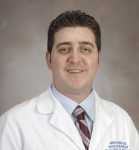
11 Feb Stroke: Outcomes of Patients Transferred for Thrombectomy
MedicalResearch.com Interview with:
Amrou Sarraj, MD, Associate Professor
Department of Neurology
McGovern Medical School
The University of Texas Health Science Center at Houston.
MedicalResearch.com: What is the background for this study? What are the main findings?
Response: Secondary analyses of trials showing efficacy and safety of thrombectomy within 6-8 hours of stroke onset showed that patients who were transferred to centers performing thrombectomy from another hospital had worse outcomes than patients who presented directly to the thrombectomy centers. We wanted to assess if the thrombectomy outcomes differ between transferred patients and patients directly coming to the thrombectomy centers when patients are selected with advanced perfusion imaging.
We found that thrombectomy outcome rates were similar between patients who presented directly vs transferred from another hospital, including functional independence and safety outcomes.
MedicalResearch.com: What should readers take away from your report?
Response: Patients transferred from another hospital did equally well compared to patients presenting directly to thrombectomy capable centers, when selected by perfusion imaging with penumbral criteria. So, transfers to thrombectomy capable centers should be encouraged in patients presenting to a non-thrombectomy center with a stroke with reasonable ischemic changes on imaging.
MedicalResearch.com: What recommendations do you have for future research as a result of this work?
Response: Although transfer patients in DEFUSE 3 did very well with thrombectomy, some patients were probably not eligible because during transfer they developed a large stroke. Future studies should try to direct potential thrombectomy candidates directly to comprehensive centers .
Disclosures: The DEFUSE 3 trial was supported by grants from National Institute of Neurological Disorders and Stroke. Dr. Sarraj was the site principal investigator for DEFUSE 3. Unrelated to the study, Dr. Sarraj has received grants from Stryker Neurovascular for SELECT and SELECT 2 trials and is a member of advisory board and speaker bureau for Stryker Neurovascular.
Citation:
[wysija_form id=”3″]
[last-modified]
The information on MedicalResearch.com is provided for educational purposes only, and is in no way intended to diagnose, cure, or treat any medical or other condition. Always seek the advice of your physician or other qualified health and ask your doctor any questions you may have regarding a medical condition. In addition to all other limitations and disclaimers in this agreement, service provider and its third party providers disclaim any liability or loss in connection with the content provided on this website.
Last Updated on February 11, 2019 by Marie Benz MD FAAD
